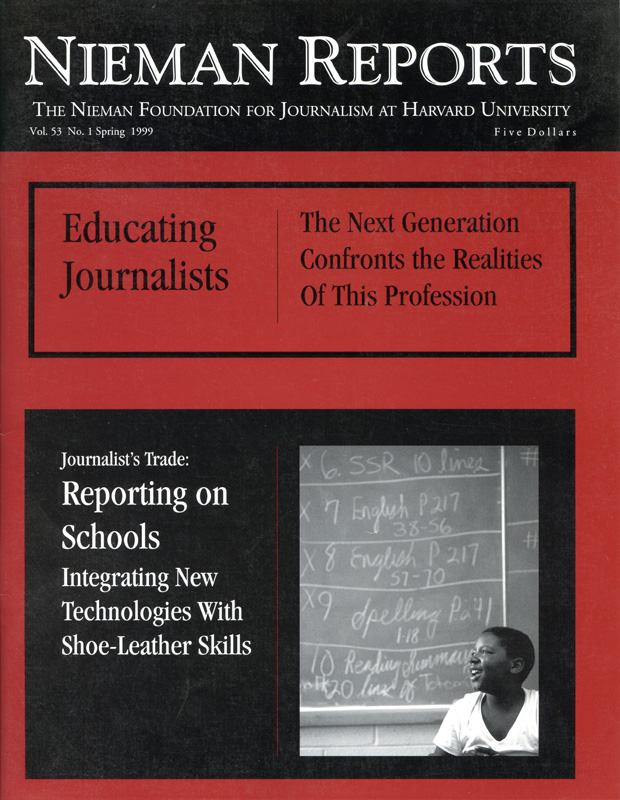This is excerpted from a December 18 Nieman seminar in which Orville Schell, Dean of the Graduate School of Journalism at Berkeley, offered his perspective on foreign news coverage.
Question: Why should the average American newspaper reader care about China? The second broader question is how should American newspapers be writing about foreign news in a way that engages readers? During the last 20 years the ways that Americans get news have changed so much, and Americans’ interest in it reflects that change. Can we write about foreign countries the same way in 1998 and 1999 as we did in 1978 and 1979?
Orville Schell: The conventional media wisdom, as you know, is that even though the world is more globalized now than ever, these days nobody cares about foreign news. And yet still in some ways, it’s true that people are presumed not to be interested in world affairs. Of course, in another way I think such disinterest is a self-fulfilling prophecy. For example, if nobody hears classical music, nobody is going to learn to really appreciate classical music. You don’t just turn on Wagner for the first time and say “wow!” But actually, as Mark Twain said, “Wagner is not as bad as it sounds.” It just takes acquiring a taste for it.
What I mean to say is that you basically have to become cultivated to something like foreign news, you have to learn to understand it to really have it be meaningful and to enjoy it. So I find it quite alarming that there is this common wisdom that nobody wants to hear about foreign news, and that’s that.…
I think there is a new way into foreign news stories at this point in history. That way is through business. But I must add that this way leaves me of two minds. I mean, now, business is “the story” and in Asia business news is particularly big—whether it’s economic miracle or meltdown. Actually, I personally don’t find purely business stories that interesting. I’m much more interested in history, culture, politics, art, things like that. But that’s just my own bias. However, business reporting presents an opportunity, a challenge, that is to take business as the central beating heart and then to try and relate it to other topics—to have it lead into other areas of life.
I’m not sure that business reporters have done that as well as they might or that people who aren’t business reporters know how to tap into the business side of the story to get to something larger that might help clarify questions of what’s going on, for instance, in literature, art and society.
It’s really interesting what’s happening because of the marketplace in publishing; that is, after all, a business story with profound political and societal implications. So business does present a way to experiment with writing about foreign stories and other subjects that haven’t been fully explored. In fact, I’m trying to get a chair set up at Berkeley to do precisely this. You know, find someone who can think about a really broad view of business reporting. How does business reporting affect human rights? How does it affect culture, religion? It’s really an interesting subject when you start opening the door on it. And I think that’s what’s missing in much reporting these days. We end up with a kind of mono-cultural approach to business journalism. We get a Bloomberg and Dow Jones view of the world and few people want to look at the larger societal effects of it all. After all, business is the animating force in this fin de siecle world of ours, and it is having a profound effect not just on commerce and finance, but on every aspect of our lives, from politics and science, to psychology and culture.
Question: Why should the average American newspaper reader care about China? The second broader question is how should American newspapers be writing about foreign news in a way that engages readers? During the last 20 years the ways that Americans get news have changed so much, and Americans’ interest in it reflects that change. Can we write about foreign countries the same way in 1998 and 1999 as we did in 1978 and 1979?
Orville Schell: The conventional media wisdom, as you know, is that even though the world is more globalized now than ever, these days nobody cares about foreign news. And yet still in some ways, it’s true that people are presumed not to be interested in world affairs. Of course, in another way I think such disinterest is a self-fulfilling prophecy. For example, if nobody hears classical music, nobody is going to learn to really appreciate classical music. You don’t just turn on Wagner for the first time and say “wow!” But actually, as Mark Twain said, “Wagner is not as bad as it sounds.” It just takes acquiring a taste for it.
What I mean to say is that you basically have to become cultivated to something like foreign news, you have to learn to understand it to really have it be meaningful and to enjoy it. So I find it quite alarming that there is this common wisdom that nobody wants to hear about foreign news, and that’s that.…
I think there is a new way into foreign news stories at this point in history. That way is through business. But I must add that this way leaves me of two minds. I mean, now, business is “the story” and in Asia business news is particularly big—whether it’s economic miracle or meltdown. Actually, I personally don’t find purely business stories that interesting. I’m much more interested in history, culture, politics, art, things like that. But that’s just my own bias. However, business reporting presents an opportunity, a challenge, that is to take business as the central beating heart and then to try and relate it to other topics—to have it lead into other areas of life.
I’m not sure that business reporters have done that as well as they might or that people who aren’t business reporters know how to tap into the business side of the story to get to something larger that might help clarify questions of what’s going on, for instance, in literature, art and society.
It’s really interesting what’s happening because of the marketplace in publishing; that is, after all, a business story with profound political and societal implications. So business does present a way to experiment with writing about foreign stories and other subjects that haven’t been fully explored. In fact, I’m trying to get a chair set up at Berkeley to do precisely this. You know, find someone who can think about a really broad view of business reporting. How does business reporting affect human rights? How does it affect culture, religion? It’s really an interesting subject when you start opening the door on it. And I think that’s what’s missing in much reporting these days. We end up with a kind of mono-cultural approach to business journalism. We get a Bloomberg and Dow Jones view of the world and few people want to look at the larger societal effects of it all. After all, business is the animating force in this fin de siecle world of ours, and it is having a profound effect not just on commerce and finance, but on every aspect of our lives, from politics and science, to psychology and culture.



